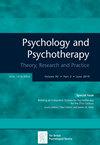Compassion focused therapy for older people: Why it is needed and adaptations for clinical practice
Abstract
Background
Compassion-focused therapy (CFT) has an emerging evidence base and is becoming an increasingly popular therapeutic modality. The journey through later life poses individuals with various challenges to navigate, including loss of roles and relationships, deteriorating physical health and cognition and death of friends and family members. In addition to any unprocessed challenges lived through in earlier life. Later life is also a unique period where reflection on one's life experiences and choices can occur, which can lead to feelings of regret, disappointment and shame for some, whilst simultaneously facing ageism and barriers to accessing therapy. CFT is well-placed to facilitate older people to face these challenges by exploring their relationship to themselves and others as they navigate ageing. This is increasingly important as we are living longer and more and more older people develop conditions where they will require care. Developing greater compassion for oneself and allowing ourselves to be cared for by others may facilitate a smoother journey and minimise distress.
Methodology
The paper summarises the published work trialling CFT across a range of older patient groups, which shows that older people are open to a CFT approach, they find it an acceptable intervention and it has had wide-reaching benefits. There remains a paucity of high-quality research delivering CFT to older people which limits our conclusions of its effectiveness.
Recommendations
Recommendations of ways in which CFT can be adapted for older people and those living with dementia, consistent with Gilbert's therapeutic themes (2022), are provided.





 求助内容:
求助内容: 应助结果提醒方式:
应助结果提醒方式:


